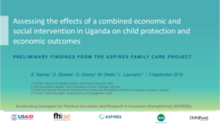The ASPIRES Family Care project was initiated to develop guidance to help practitioners match specific economic strengthening interventions to households with particular characteristics in specific contexts. Launched in 2013 by FHI 360 and with an end date of September 2019, ASPIRES initially carried out an extensive literature review. The project has also implemented an online survey of projects using economic strengthening to help prevent unnecessary family separation and to support family reintegration. To test the strengths and limitations of different approaches to household economic strengthening relevant to these outcomes the ASPIRES Family Care project initiated two field projects in Uganda: AVSI Foundation’s Family Resilience (FARE) and ChildFund’s Economic Strengthening to Keep and Reintegrate Children in Families (ESFAM).
Two presentations and a poster providing overviews of initial learning from FARE and ESFAM were delivered at the ISPCAN Conference in September 2018. This presentation highlights the preliminary findings from the ASPIRES Family Care Projects as regards the effects of a combined economic and social intervention on child protection and economic outcomes. Findings indicate that the programming shows promise for reducing drivers of family-child separation.
View the other presentation here.

